Charles E W Bean, Diaries, AWM38 3DRL 606/237/1 - October 1914 - 1918 - Part 4
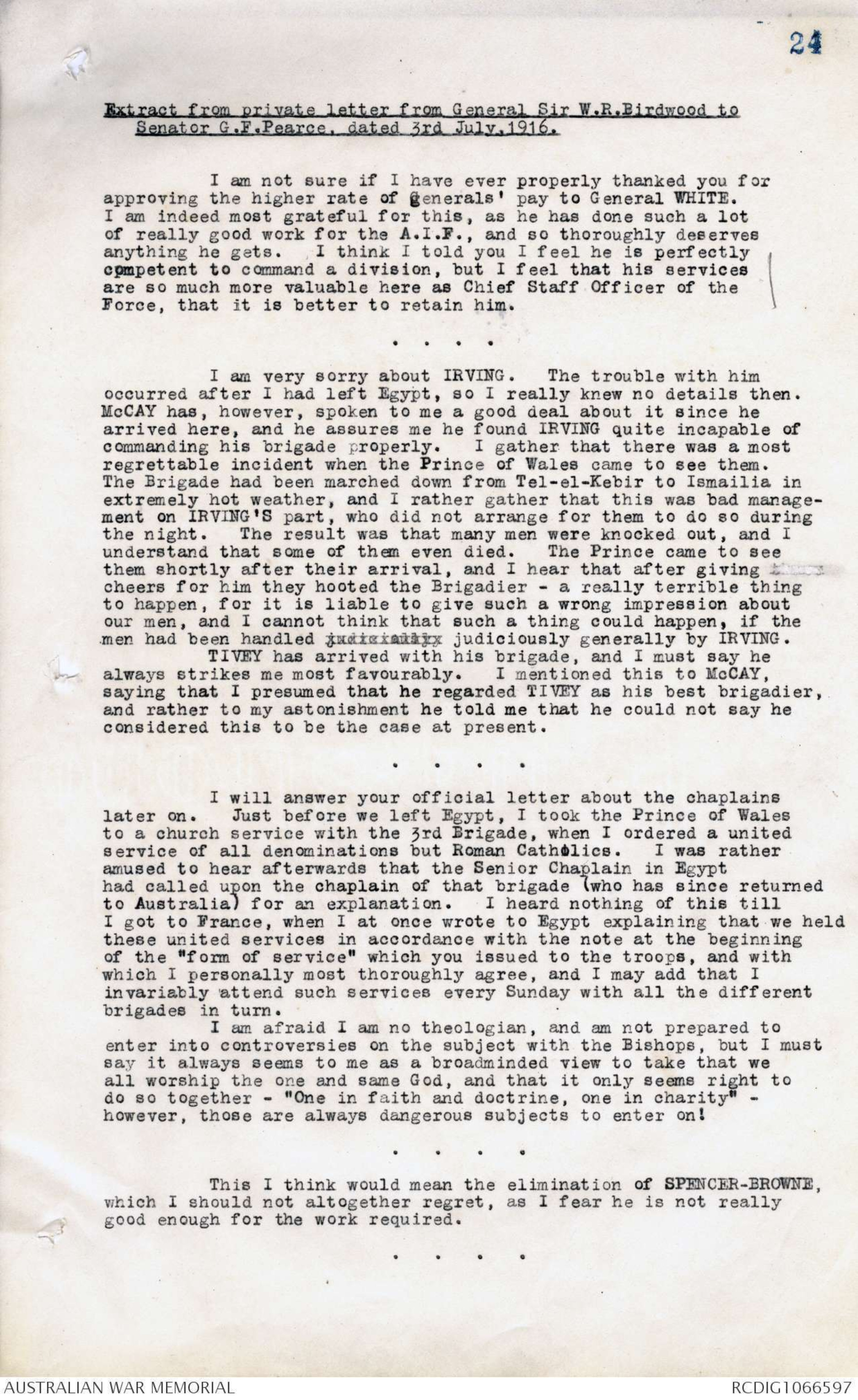
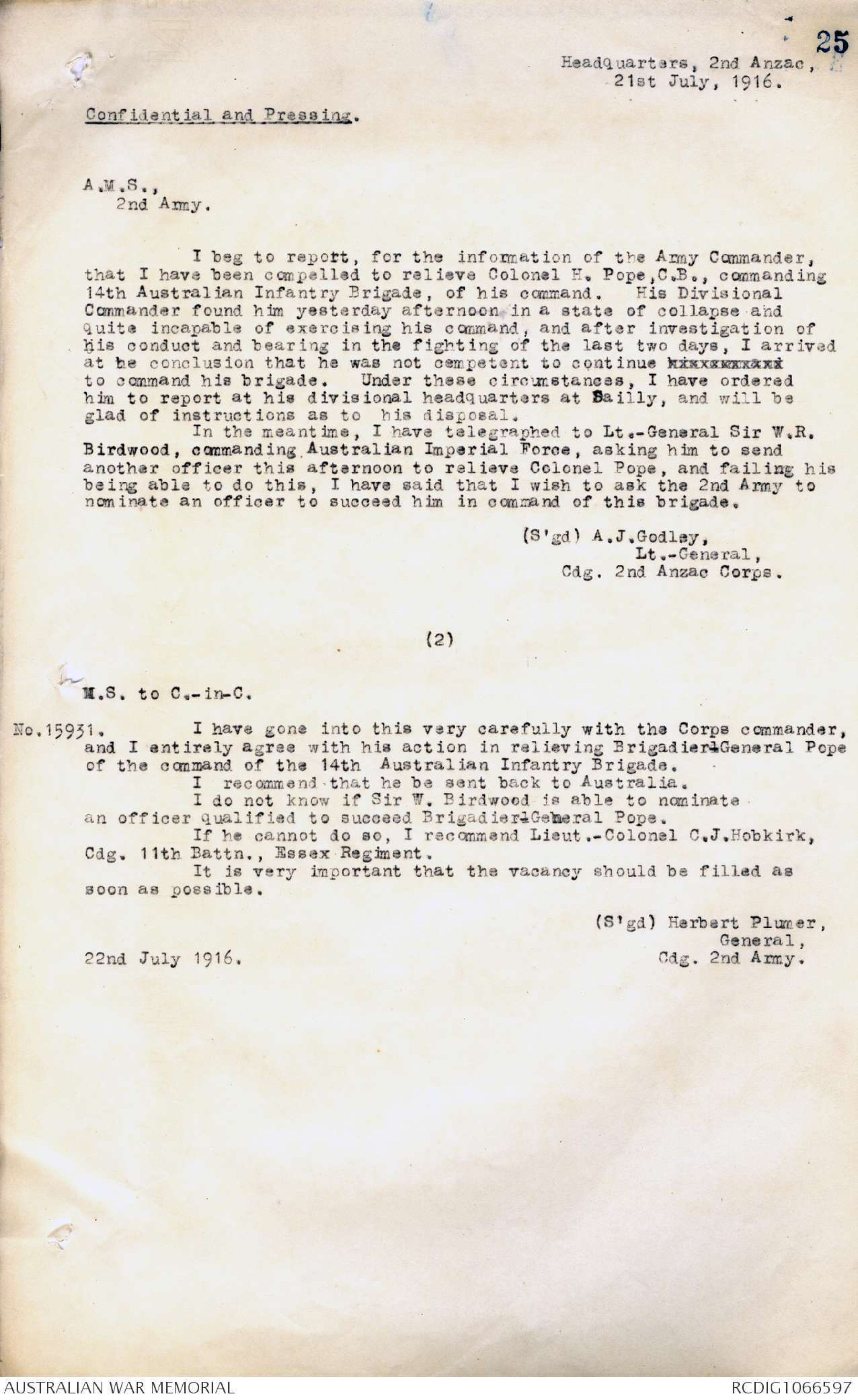
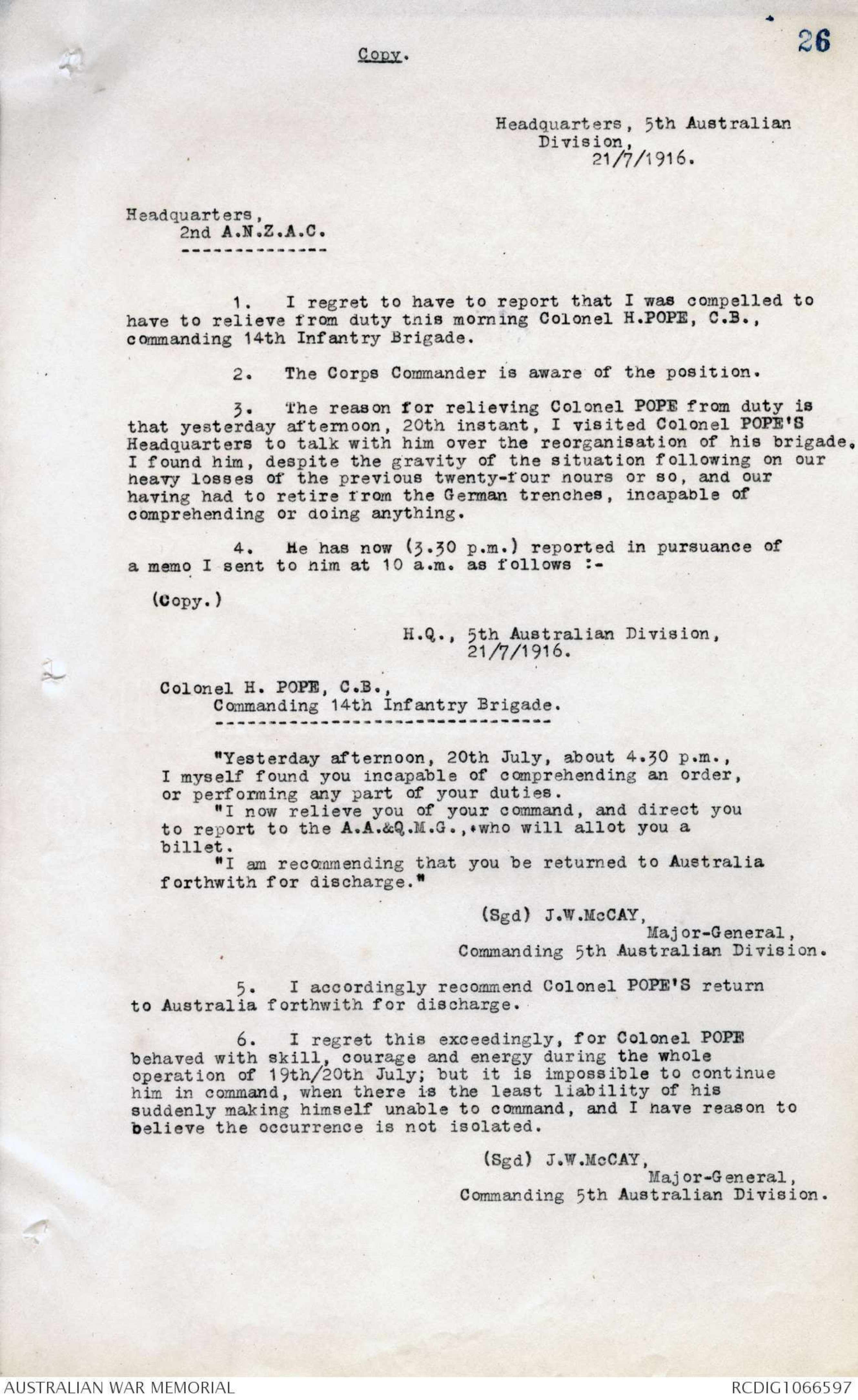
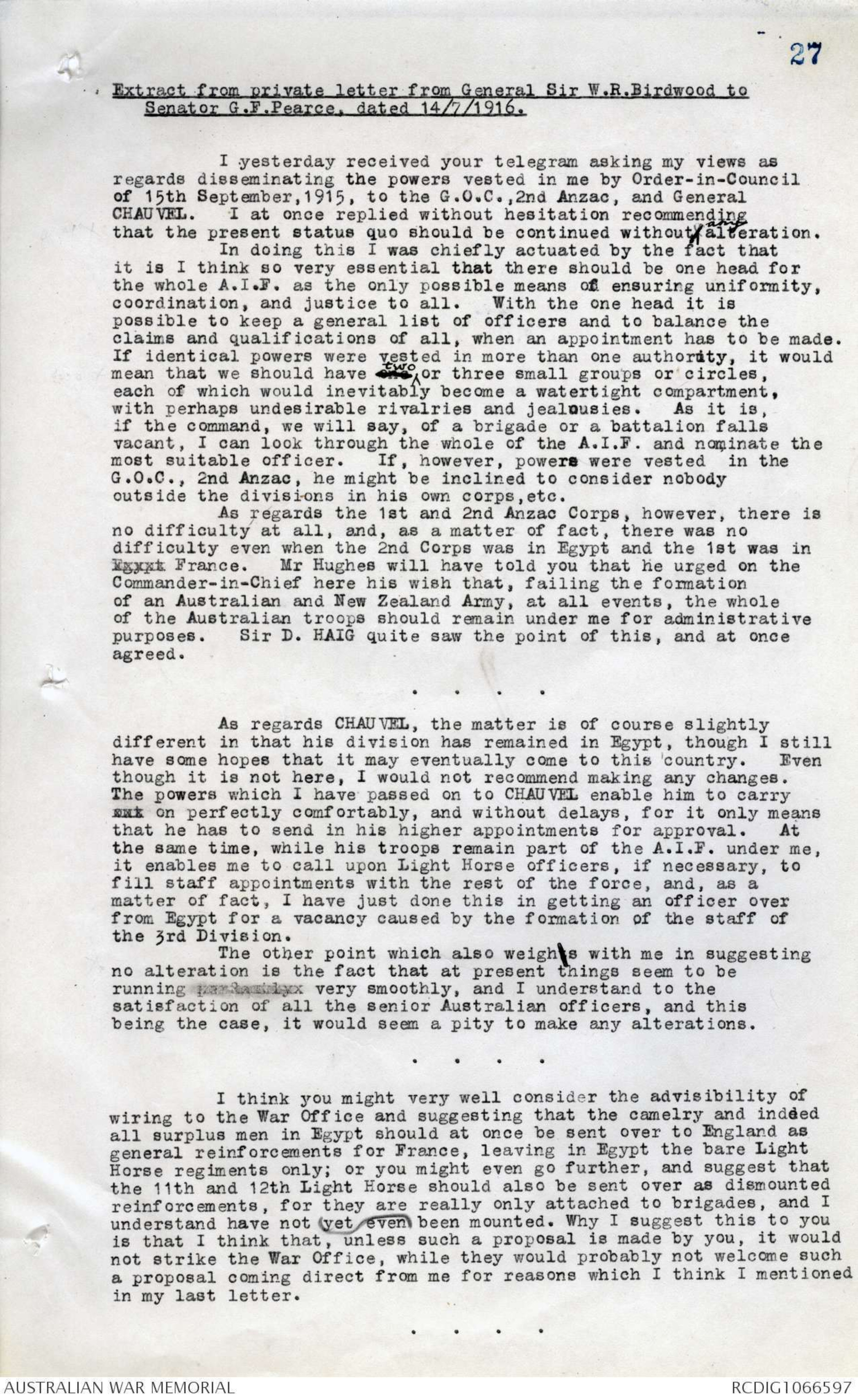
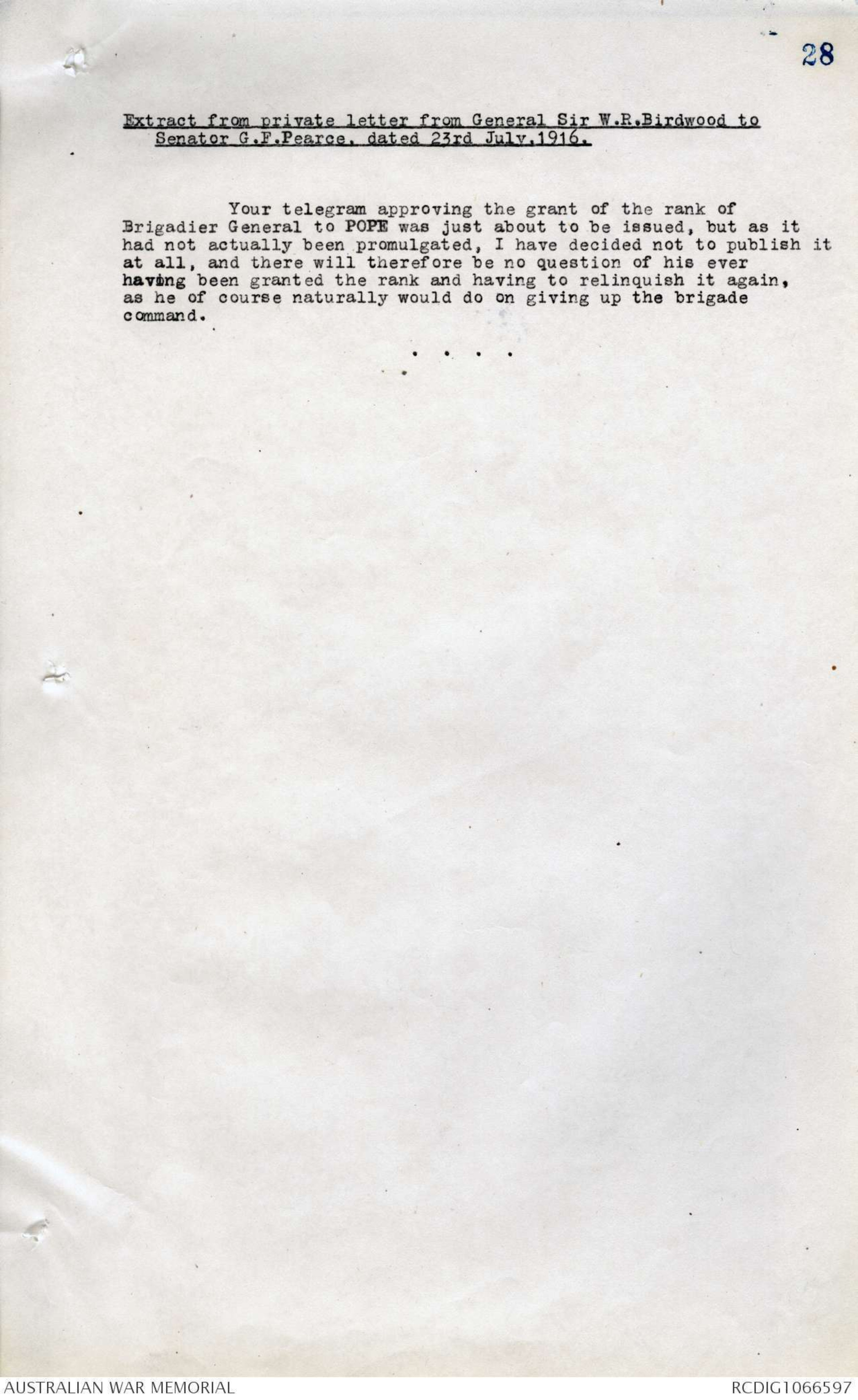
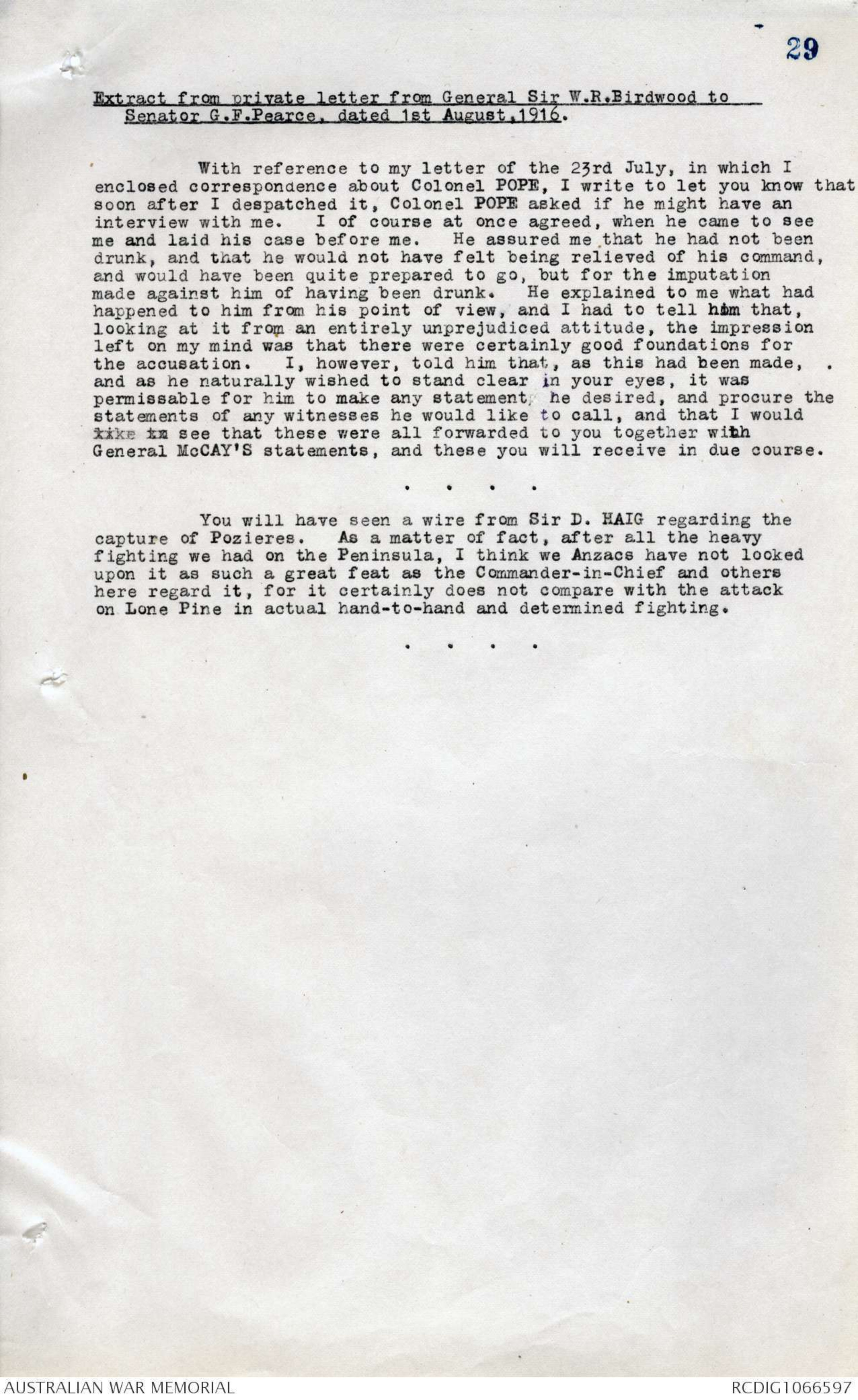
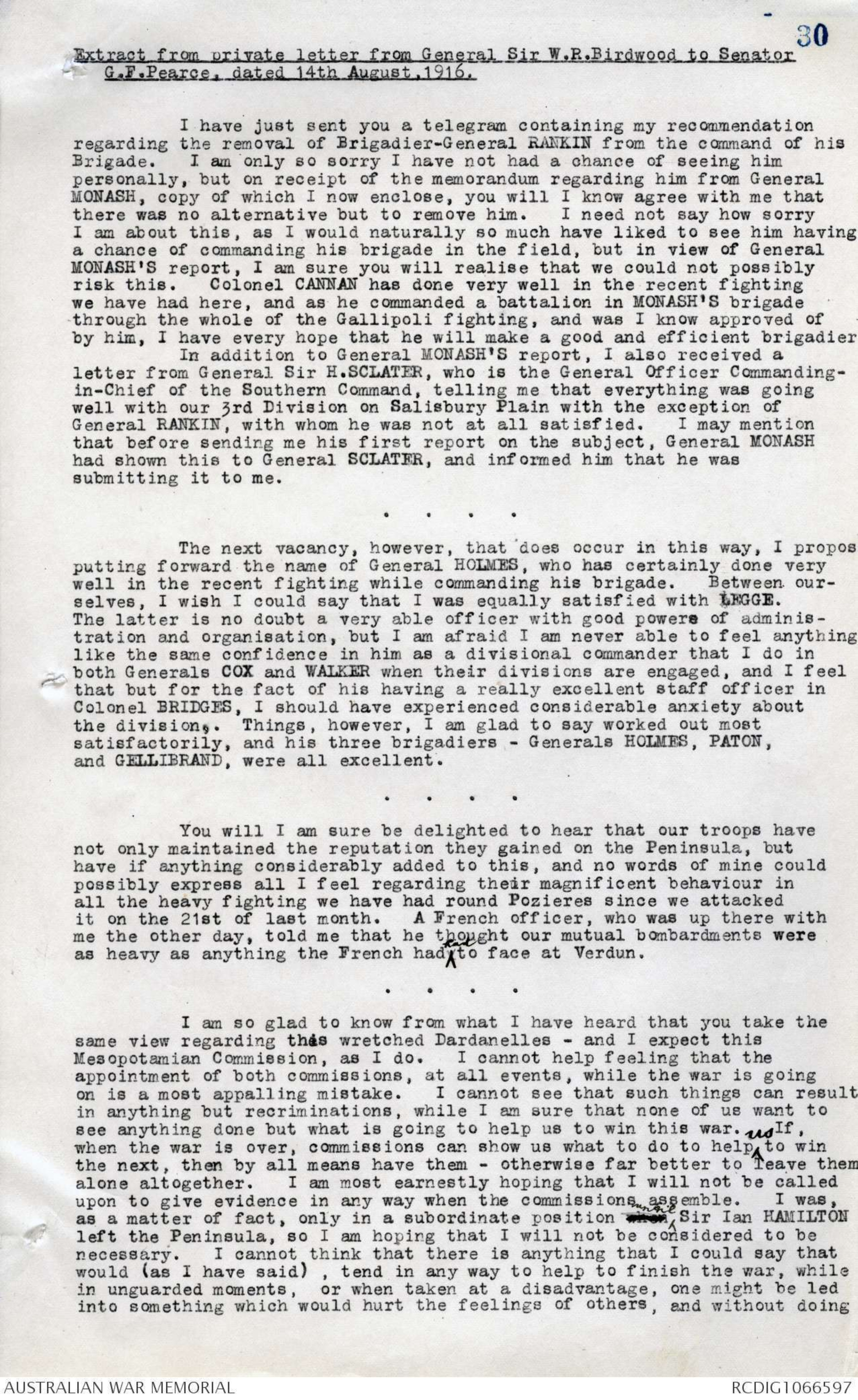
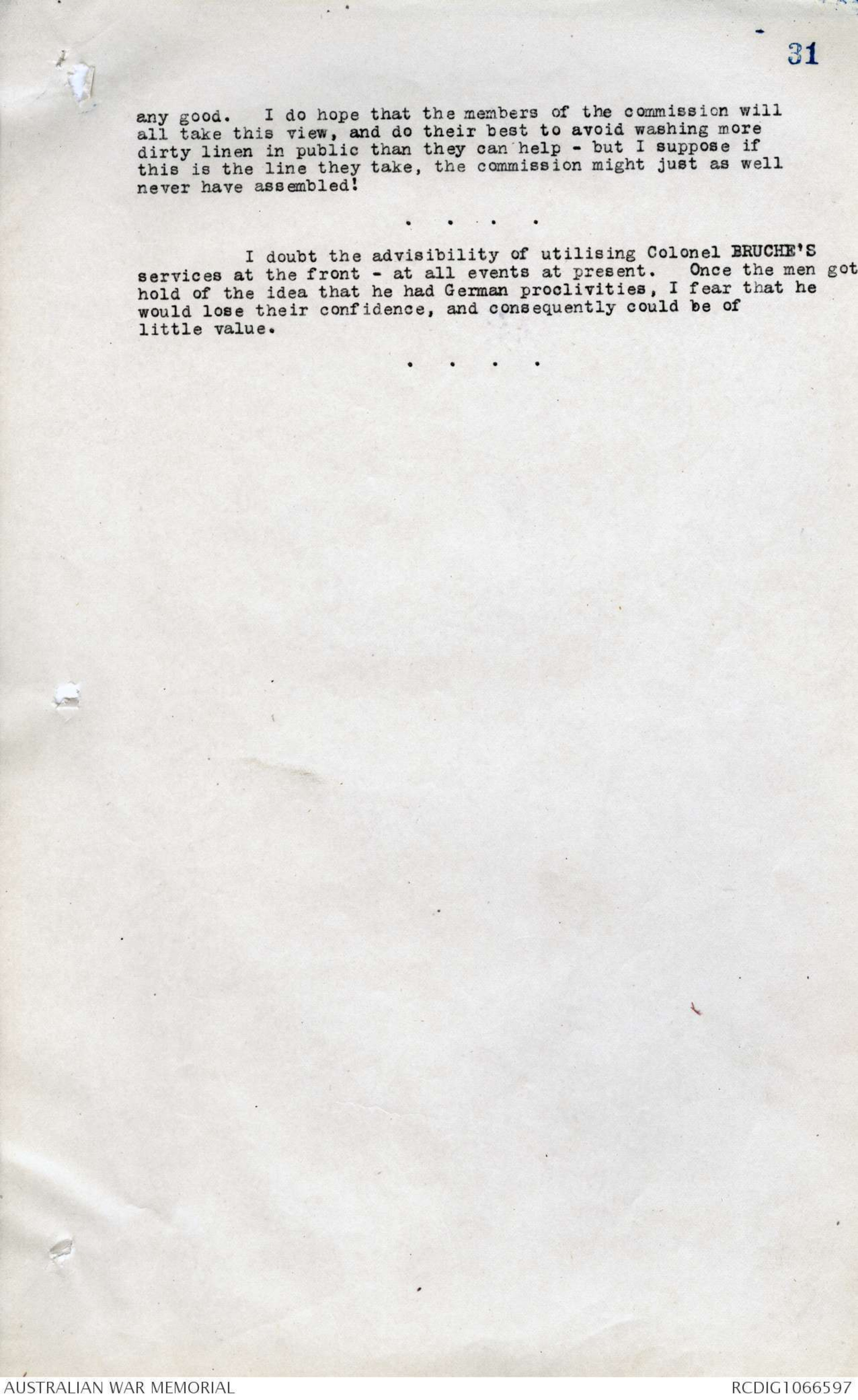
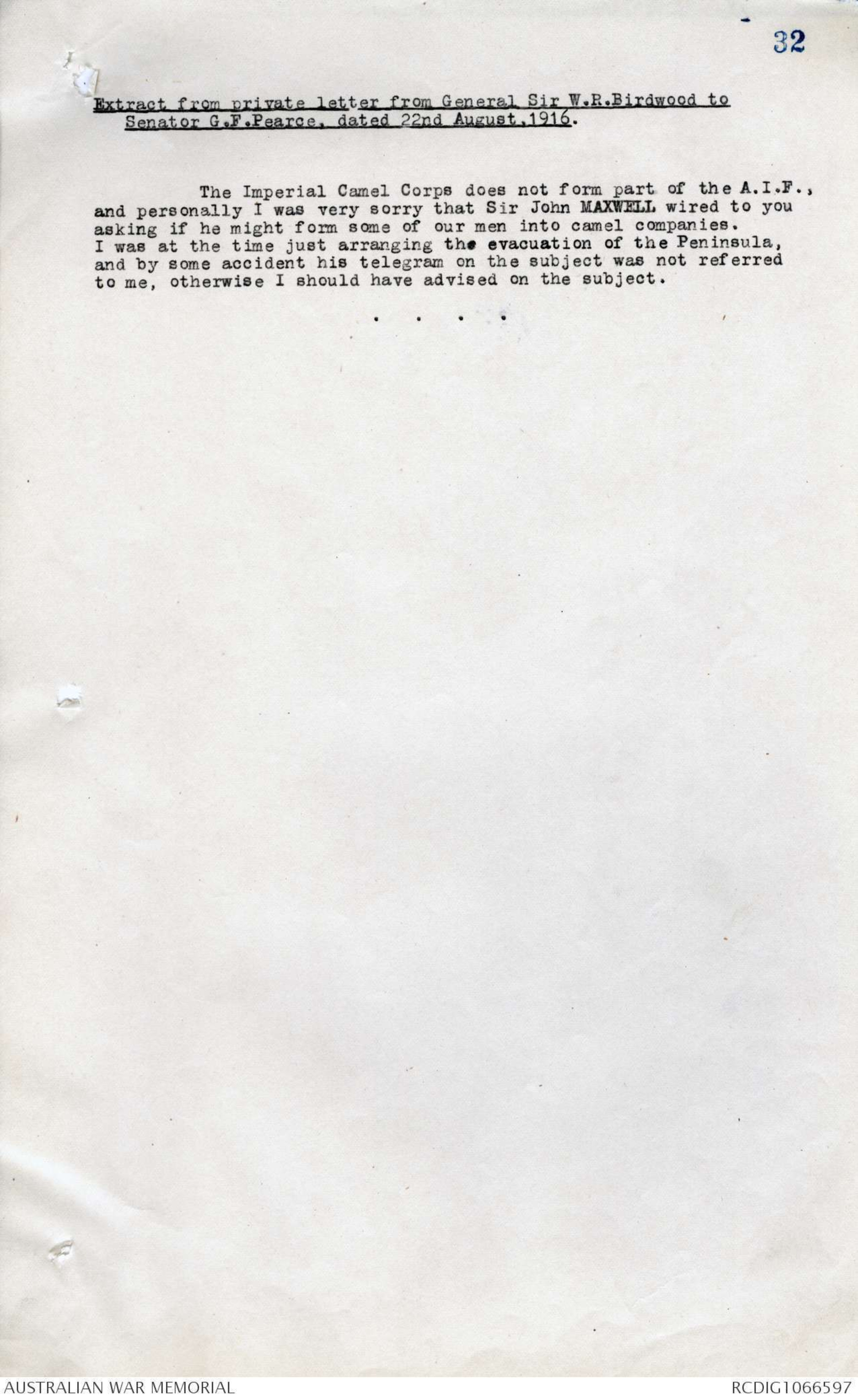
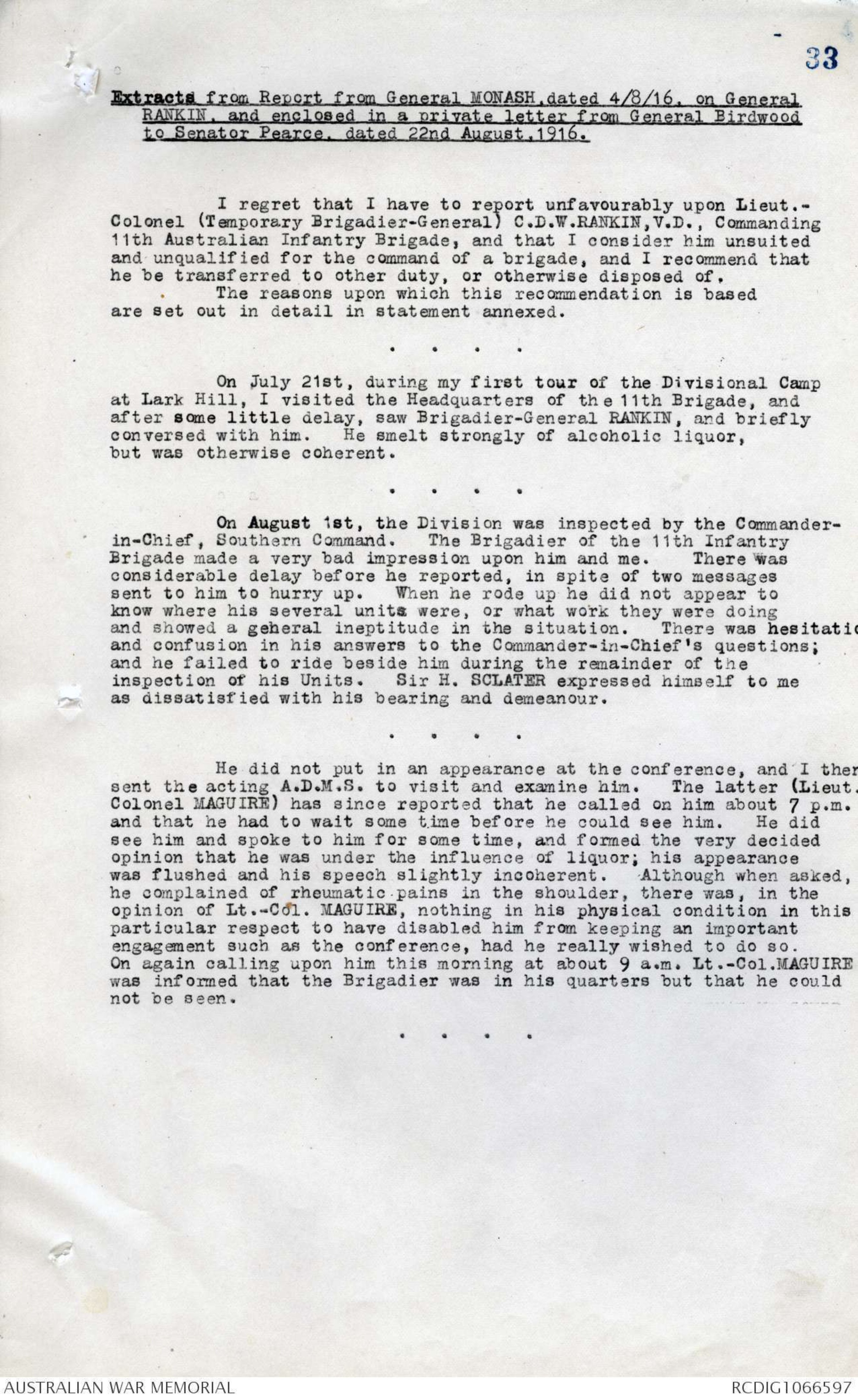
24
Extract from private letter from General Sir W.R.Birdwood to
Senator G.F.Pearce, dated 3rd July, 1916.
I am not sure if I have ever properly thanked you for
approving the higher rate of generals' pay to General WHITE.
I am indeed most grateful for this, as he has done such a lot
of really good work for the A.I.F., and so thoroughly deserves
anything he gets. I think I told you I feel he is perfectly
competent to command a division, but I feel that his services
are so much more valuable here as Chief Staff Officer of the
Force, that it is better to retain him.
I am very sorry about IRVING. The trouble with him
occurred after I had left Egypt, so I really knew no details then.
McCAY has, however, spoken to me a good deal about it since he
arrived here, and he assures me he found IRVING quite incapable of
commanding his brigade properly. I gather that there was a most
regrettable incident when the Prince of Wales came to see them.
The Brigade had been marched down from Tel-el-Kebir to Ismailia in
extremely hot weather, and I rather gather that this was bad management
on IRVING'S part, who did not arrange for them to do so during
the night. The result was that many men were knocked out, and I
understand that some of them even died. The Prince came to see
them shortly after their arrival, and I hear that after giving three
cheers for him they hooted the Brigadier - a really terrible thing
to happen, for it is liable to give such a wrong impression about
our men, and I cannot think that such a thing could happen, if the
men had been handled judicially judiciously generally by IRVING.
TIVEY has arrived with his brigade, and I must say he
always strikes me most favourably. I mentioned this to McCAY,
saying that I presumed that he regarded TIVEY as his best brigadier,
and rather to my astonishment he told me that he could not say he
considered this to be the case at present.
I will answer your official letter about the chaplains
later on. Just before we left Egypt, I took the Prince of Wales
to a church service with the 3rd Brigade, when I ordered a united
service of all denominations but Roman Catholics. I was rather
amused to hear afterwards that the Senior Chaplain in Egypt
had called upon the chaplain of that brigade (who has since returned
to Australia) for an explanation. I heard nothing of this till
I got to France, when I at once wrote to Egypt explaining that we held
these united services in accordance with the note at the beginning
of the "form of service" which you issued to the troops, and with
which I personally most thoroughly agree, and I may add that I
invariably attend such services every Sunday with all the different
brigades in turn.
I am afraid I am no theologian, and am not prepared to
enter into controversies on the subject with the Bishops, but I must
say it always seems to me as a broadminded view to take that we
all worship the one and same God, and that it only seems right to
do so together - "One in faith and doctrine, one in charity" -
however, those are always dangerous subjects to enter on!
This I think would mean the elimination of SPENCER-BROWNE,
which I should not altogether regret, as I fear he is not really
good enough for the work required.
25
Headquarters, 2nd Anzac,
21st July, 1916.
Confidential and Pressing.
A.M.S.,
2nd Army.
I beg to report, for the information of the Army Commander,
that I have been compelled to relieve Colonel H. Pope, C.B., commanding
14th Australian Infantry Brigade, of his command. His Divisional
Commander found him yesterday afternoon in a state of collapse and
quite incapable of exercising his command, and after investigation of
his conduct and bearing in the fighting of the last two days, I arrived
at he conclusion that he was not competent to continue his command
to command his brigade. Under these circumstances, I have ordered
him to report at his divisional headquarters at Sailly, and will be
glad of instructions as to his disposal.
In the meantime, I have telegraphed to Lt.-General Sir W.R.
Birdwood, commanding Australian Imperial Force, asking him to send
another officer this afternoon to relieve Colonel Pope, and failing his
being able to do this, I have said that I wish to ask the 2nd Army to
nominate an officer to succeed him in command of this brigade.
(S'gd) A.J.Godley,
Lt.-General,
Cdg. 2nd Anzac Corps.
(2)
M.S. to C.-in-C.
No.15931. I have gone into this very carefully with the Corps commander,
and I entirely agree with his action in relieving Brigadier-General Pope
of the command of the 14th Australian Infantry Brigade.
I recommend that he be sent back to Australia.
I do not know if Sir W. Birdwood is able to nominate
an officer qualified to succeed Brigadier-General Pope.
If he cannot do so, I recommend Lieut.-Colonel C.J. Hobkirk,
Cdg. 11th Battn., Essex Regiment.
It is very important that the vacancy should be filled as
soon as possible.
(S'gd) Herbert Plumer,
General,
Cdg. 2nd Army.
22nd July 1916.
26
Copy.
Headquarters, 5th Australian
Division,
21/7/1916.
Headquarters,
2nd A.N.Z.A.C.
1. I regret to have to report that I was compelled to
have to relieve from duty this morning Colonel H. POPE, C.B.,
commanding 14th Infantry Brigade.
2. The Corps Commander is aware of the position.
3. The reason for relieving Colonel POPE from duty is
that yesterday afternoon, 20th instant, I visited Colonel POPE'S
Headquarters to talk with him over the reorganisation of his brigade.
I found him, despite the gravity of the situation following on our
heavy losses of the previous twenty-four hours or so, and our
having had to retire from the German trenches, incapable of
comprehending or doing anything.
4. He has now (3.30 p.m.) reported in pursuance of
a memo I sent to him at 10 a.m. as follows :-
(Copy.)
H.Q., 5th Australian Division,
21/7/1916.
Colonel H. POPE, C.B.,
Commanding 14th Infantry Brigade.
"Yesterday afternoon, 20th July, about 4.30 p.m.,
I myself found you incapable of comprehending an order,
or performing any part of your duties.
"I now relieve you of your command, and direct you
to report to the A.A.&Q.M.G.,. who will allot you a
billet.
"I am recommending that you be returned to Australia
forthwith for discharge. "
(Sgd) J.W.McCAY,
Major-General,
Commanding 5th Australian Division.
5. I accordingly recommend Colonel POPE'S return
to Australia forthwith for discharge.
6. I regret this exceedingly, for Colonel POPE
behaved with skill, courage and energy during the whole
operation of 19th/20th July; but it is impossible to continue
him in command, when there is the least liability of his
suddenly making himself unable to command, and I have reason to
believe the occurrence is not isolated.
(Sgd) J.W.McCAY,
Major-General,
Commanding 5th Australian Division.
27
Extract from private letter from General Sir W.R.Birdwood to
Senator G.F.Pearce, dated 14/7/1916.
I yesterday received your telegram asking my views as
regards disseminating the powers vested in me by Order-in-Council
of 15th September, 1915, to the G.O.C., 2nd Anzac, and General
CHAUVEL. I at once replied without hesitation recommending
that the present status quo should be continued without ^any alteration.
In doing this I was chiefly actuated by the fact that
it is I think so very essential that there should be one head for
the whole A.I.F. as the only possible means of ensuring uniformity,
coordination, and justice to all. With the one head it is
possible to keep a general list of officers and to balance the
claims and qualifications of all, when an appointment has to be made.
If identical powers were vested in more than one authority, it would
mean that we should have one ^ two or three small groups or circles,
each of which would inevitably become a watertight compartment,
with perhaps undesirable rivalries and jealousies. As it is,
if the command, we will say, of a brigade or a battalion falls
vacant, I can look through the whole of the A.I.F. and nominate the
most suitable officer. If, however, powers were vested in the
G.O.C., 2nd Anzac, he might be inclined to consider nobody
outside the divisions in his own corps, etc.
As regards the 1st and 2nd Anzac Corps, however, there is
no difficulty at all, and, as a matter of fact, there was no
difficulty even when the 2nd Corps was in Egypt and the 1st was inEgypt France. Mr Hughes will have told you that he urged on the
Commander-in-Chief here his wish that, failing the formation
of an Australian and New Zealand Army, at all events, the whole
of the Australian troops should remain under me for administrative
purposes. Sir D. HAIG quite saw the point of this, and at once
agreed.
As regards CHAUVEL, the matter is of course slightly
different in that his division has remained in Egypt, though I still
have some hopes that it may eventually come to this country. Even
though it is not here, I would not recommend making any changes.
The powers which I have passed on to CHAUVEL enable him to carryout on perfectly comfortably, and without delays, for it only means
that he has to send in his higher appointments for approval. At
the same time, while his troops remain part of the A.I.F. under me,
it enables me to call upon Light Horse officers, if necessary, to
fill staff appointments with the rest of the force, and, as a
matter of fact, I have just done this in getting an officer over
from Egypt for a vacancy caused by the formation of the staff of
the 3rd Division.
The other point which also weights with me in suggesting
no alteration is the fact that at present things seem to be
running xxxxxxxxxx very smoothly, and I understand to the
satisfaction of all the senior Australian officers, and this
being the case, it would seem a pity to make any alterations.
I think you might very well consider the advisibility of
wiring to the War Office and suggesting that the camelry and indeed
all surplus men in Egypt should at once be sent over to England as
general reinforcements for France, leaving in Egypt the bare Light
Horse regiments only; or you might even go further, and suggest that
the 11th and 12th Light Horse should also be sent over as dismounted
reinforcements, for they are really only attached to brigades, and I
understand have not yet even been mounted. Why I suggest this to you
is that I think that, unless such a proposal is made by you, it would
not strike the War Office, while they would probably not welcome such
a proposal coming direct from me for reasons which I think I mentioned
in my last letter.
28
Extract from private letter from General Sir W.R.Birdwood to
Senator G.F.Pearce, dated 23rd July, 1916.
Your telegram approving the grant of the rank of
Brigadier General to POPE was just about to be issued, but as it
had not actually been promulgated, I have decided not to publish it
at all, and there will therefore be no question of his ever
having been granted the rank and having to relinquish it again,
as he of course naturally would do on giving up the brigade
command.
29
Extract from private letter from General Sir W.R.Birdwood to
Senator G.F.Pearce, dated 1st August.1916.
With reference to my letter of the 23rd July, in which I
enclosed correspondence about Colonel POPE, I write to let you know that
soon after I despatched it, Colonel POPE asked if he might have an
interview with me. I of course at once agreed, when he came to see
me and laid his case before me. He assured me that he had not been
drunk, and that he would not have felt being relieved of his command,
and would have been quite prepared to go, but for the imputation
made against him of having been drunk. He explained to me what had
happened to him from his point of view, and I had to tell him that,
looking at it from an entirely unprejudiced attitude, the impression
left on my mind was that there were certainly good foundations for
the accusation. I, however, told him that, as this had been made,
and as he naturally wished to stand clear in your eyes, it was
permissable for him to make any statement he desired, and procure the
statements of any witnesses he would like to call, and that I wouldlike to see that these were all forwarded to you together with
General McCAY'S statements, and these you will receive in due course.
You will have seen a wire from Sir D. HAIG regarding the
capture of Pozieres. As a matter of fact, after all the heavy
fighting we had on the Peninsula, I think we Anzacs have not looked
upon it as such a great feat as the Commander-in-Chief and others
here regard it, for it certainly does not compare with the attack
on Lone Pine in actual hand-to-hand and determined fighting.
30
Extract from private letter from General Sir W.R.Birdwood to Senator
G.F.Pearce, dated 14th August, 1916.
I have just sent you a telegram containing my recommendation
regarding the removal of Brigadier-General RANKIN from the command of his
Brigade. I am only so sorry I have not had a chance of seeing him
personally, but on receipt of the memorandum regarding him from General
MONASH, copy of which I now enclose, you will I know agree with me that
there was no alternative but to remove him. I need not say how sorry
I am about this, as I would naturally so much have liked to see him having
a chance of commanding his brigade in the field, but in view of General
MONASH'S report, I am sure you will realise that we could not possibly
risk this. Colonel CANNAN has done very well in the recent fighting
we have had here, and as he commanded a battalion in MONASH'S brigade
through the whole of the Gallipoli fighting, and was I know approved of
by him, I have every hope that he will make a good and efficient brigadier
In addition to General MONASH'S report, I also received a
letter from General Sir H.SCLATER, who is the General Officer Commanding-in-Chief
of the Southern Command, telling me that everything was going
well with our 3rd Division on Salisbury Plain with the exception of
General RANKIN, with whom he was not at all satisfied. I may mention
that before sending me his first report on the subject, General MONASH
had shown this to General SCLATER, and informed him that he was
submitting it to me.
The next vacancy, however, that does occur in this way, I propos
putting forward the name of General HOLMES, who has certainly done very
well in the recent fighting while commanding his brigade. Between ourselves,
I wish I could say that I was equally satisfied with LEGGE.
The latter is no doubt a very able officer with good powers of administration
and organisation, but I am afraid I am never able to feel anything
like the same confidence in him as a divisional commander that I do in
both Generals COX and WALKER when their divisions are engaged, and I feel
that but for the fact of his having a really excellent staff officer in
Colonel BRIDGES, I should have experienced considerable anxiety about
the division,. Things, however, I am glad to say worked out most
satisfactorily, and his three brigadiers - Generals HOLMES, PATON,
and GELLIBRAND, were all excellent.
You will I am sure be delighted to hear that our troops have
not only maintained the reputation they gained on the Peninsula, but
have if anything considerably added to this, and no words of mine could
possibly express all I feel regarding their magnificent behaviour in
all the heavy fighting we have had round Pozieres since we attacked
it on the 21st of last month. A French officer, who was up there with
me the other day, told me that he thought our mutual bombardments were
as heavy as anything the French had ^had to face at Verdun.
I am so glad to know from what I have heard that you take the
same view regarding this wretched Dardanelles - and I expect this
Mesopotamian Commission, as I do. I cannot help feeling that the
appointment of both commissions, at all events, while the war is going
on is a most appalling mistake. I cannot see that such things can result
in anything but recriminations, while I am sure that none of us want to
see anything done but what is going to help us to win this war. If,
when the war is over, commissions can show us what to do to help ^us to win
the next, then by all means have them - otherwise far better to leave them
alone altogether. I am most earnestly hoping that I will not be called
upon to give evidence in any way when the commissions assemble. I was,
as a matter of fact, only in a subordinate position when ^until Sir Ian HAMILTON
left the Peninsula, so I am hoping that I will not be considered to be
necessary. I cannot think that there is anything that I could say that
would (as I have said), tend in any way to help to finish the war, while
in unguarded moments, or when taken at a disadvantage, one might be led
into something which would hurt the feelings of others, and without doing
31
any good. I do hope that the members of the commission will
all take this view, and do their best to avoid washing more
dirty linen in public than they can help - but I suppose if
this is the line they take, the commission might just as well
never have assembled!
I doubt the advisibility of utilising Colonel BRUCHE'S
services at the front - at all events at present. Once the men got
hold of the idea that he had German proclivities, I fear that he
would lose their confidence, and consequently could be of
little value.
32
Extract from private letter from General Sir W.R.Birdwood to
Senator G.F.Pearce, dated 22nd August, 1916.
The Imperial Camel Corps does not form part of the A.I.F.,
and personally I was very sorry that Sir John MAXWELL wired to you
asking if he might form some of our men into camel companies.
I was at the time just arranging the evacuation of the Peninsula,
and by some accident his telegram on the subject was not referred
to me, otherwise I should have advised on the subject.
33
Extracts from Report from General MONASH, dated 4/8/16, on General
RANKIN, and enclosed in a private letter from General Birdwood
to Senator Pearce, dated 22nd August, 1916.
I regret that I have to report unfavourably upon Lieut.-Colonel
(Temporary Brigadier-General) C.D.W.RANKIN,V.D., Commanding
11th Australian Infantry Brigade, and that I consider him unsuited
and unqualified for the command of a brigade, and I recommend that
he be transferred to other duty, or otherwise disposed of.
The reasons upon which this recommendation is based
are set out in detail in statement annexed.
On July 21st, during my first tour of the Divisional Camp
at Lark Hill, I visited the Headquarters of the 11th Brigade, and
after some little delay, saw Brigadier-General RANKIN, and briefly
conversed with him. He smelt strongly of alcoholic liquor,
but was otherwise coherent.
On August 1st, the Division was inspected by the Commander-in-Chief,
Southern Command. The Brigadier of the 11th Infantry
Brigade made a very bad impression upon him and me. There was
considerable delay before he reported, in spite of two messages
sent to him to hurry up. When he rode up he did not appear to
know where his several units were, or what work they were doing
and showed a general ineptitude in the situation. There was hesitati
and confusion in his answers to the Commander-in-Chief's questions;
and he failed to ride beside him during the remainder of the
inspection of his Units. Sir H. SCLATER expressed himself to me
as dissatisfied with his bearing and demeanour.
He did not put in an appearance at the conference, and I the
sent the acting A.D.M.S. to visit and examine him. The latter (Lieut-Colonel
MAGUIRE) has since reported that he called on him about 7 p.m.
and that he had to wait some time before he could see him. He did
see him and spoke to him for some time, and formed the very decided
opinion that he was under the influence of liquor; his appearance
was flushed and his speech slightly incoherent. Although when asked,
he complained of rheumatic pains in the shoulder, there was, in the
opinion of Lt.-Col. MAGUIRE, nothing in his physical condition in this
particular respect to have disabled him from keeping an important
engagement such as the conference, had he really wished to do so.
On again calling upon him this morning at about 9 a.m. Lt.-Col. MAGUIRE
was informed that the Brigadier was in his quarters but that he could
not be seen.
 Not Yet Replaced By AI
Not Yet Replaced By AIThis transcription item is now locked to you for editing. To release the lock either Save your changes or Cancel.
This lock will be automatically released after 60 minutes of inactivity.